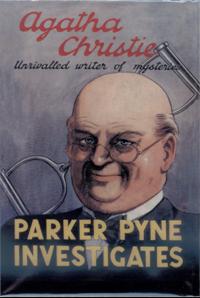
Parker Pyne Investigates: “…. the mere sight of Mr. Parker Pyne brought a feeling of reassurance. He was large, not to say fat; he had a bald head of noble proportions, strong glasses, and little twinkling eyes.”
Detective: Mr. Parker Pyne
Published: November 1934
Length: 251 pages
Setting: London, Geneva, Paris, Venice, Trieste, Constantinople, Damascus, Iraq, Tehran, Shiraz, Delphi, Palma, Dartmouth and other places
Mr. James Parker Pyne is a man who knows human nature. Has he travelled and observed and applied psychology? No! For thirty-five years of his life he sat in an office compiling statistics for the government but, in doing so, used the experience to learn how to classify the unhappiness of people into five main categories and then employ ingenious, yet practical methods, to rectify it. He labels himself, “a detective of the heart.”
His advertisement in the personal section of the newspaper reads:
ARE YOU HAPPY? IF NOT, CONSULT MR. PARKER PYNE, 17 RICHMOND STREET.
Unlike Hercule Poirot, Parker Pyne is not interested murder but affairs of the heart, applying his knowledge of human nature to every problem.
The book contains fourteen different stories or cases entitled:
- The Case of the Middle-Aged Wife
- The Case of the Discontented Soldier
- The Case of the Distressed Lady
- The Case of the Discontented Husband
- The Case of the City Clerk
- The Case of the Rich Woman
- Have You Got Everything You Want?
- The Gate of Baghdad
- The House at Shiraz
- The Pearl of Price
- Death on the Nile
- The Oracle at Delphi
- Problem at Pollensa Bay
- The Regatta Mystery
Pyne thinks up very unconventional solutions to his client’s problems which make these stories interesting if not spectacular.
And lo and behold, we also meet both Adriane Oliver the novelist, who makes various appearances in other Christie mysteries, and Miss Felicity Lemon, who becomes Hercule Poirot’s very efficient secretary.
Was it my favourite Christie novel? No. But as always, Dame Christie produces an interesting and engaging read.
⇐ Why Didn’t They Ask Evans? Three Act Tragedy ⇔



